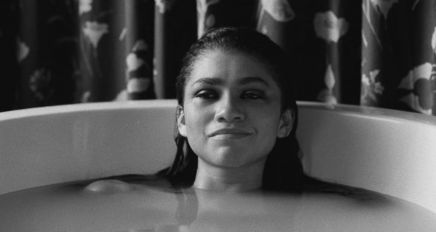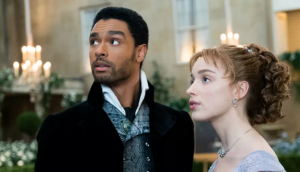‘Malcolm and Marie’ A Pandemic Film at its Finest.

picture from google.com
January 6, 2023
‘Malcolm and Marie’ A Pandemic Film at its Finest.
It’s the middle of 2021 and I find myself bored and wanting something new to watch. Sam Levinson’s Netflix film happens to run across my TV screen. Naturally, I can’t resist watching another film with Zendaya. When I first clicked on “Malcolm and Marie” I had no idea what I was getting myself into for the next hour and a half.
The turbulent relationship between the two characters keeps you engaged and desperately wanting the conflict to be resolved. And despite how little you get to know the characters, you still find yourself rooting for their success.
This film, while it has its ups and downs, is all sparked by the basic human need to be appreciated. Whether it be romantically or within the job field, this film shows how being underappreciated leads to toxicity within one’s relationship with self and those around them. Levinson tackles this theme by using intense dialogue, intimacy, and music.
We begin the movie with an opening shot of the outside of the house where our character’s love-hate relationship takes place. We see Malcolm (John David-Washington) and Marie (Zendaya) enter the home from a premiere event held in honor of Malcolm’s breakout film.
The giddiness and good energy radiating from Malcolm are zero indicators for what’s to come. A stronger indication is Marie, who walks into the home with little to no acknowledgment of Malcolm’s self-celebration. Despite Marie’s mood, Malcolm goes on a tangent about his film and his starring actress. Immediately you can feel the tension fill the whole room. This is where we see the first example of underappreciation.
After his rambling, Malcolm tries to love on Marie who couldn’t seem any further from interested. Here is when we find out through some intense dialogue, and some mac and cheese, that Marie was not thanked during Malcolm’s speech at the premiere, despite the movie being inspired by her treacherous past with drug use. Marie states, “It’s not just about you forgetting to thank me. It’s about how you see me and how you view my contribution, not just to this relationship, but to your work.”
It’s the dialogue within the film that adds such a dash of realism to the movie that helps us sympathize with the characters. The dialogue helps give Marie a little more depth throughout the film. Something that allows her to seem like more than a self-pitying failed actress. On the contrary, much of Malcolm’s dialogue reveals an egotistical jerk with narcissistic personality traits.
However, paying close attention to what Malcolm is saying reveals that his narcissistic traits stem from the lack of appreciation he receives for his art. So to compensate for the lack of recognition from critics, he tries to boost his confidence by believing he is above mistakes and above what “higher level” white directors create. When you come to think of it, it is quite an ironic idea considering Levinson is a white director trying to create a story based on the experiences of a black filmmaker, but I digress.
After what seems like hours of arguments, we finally reach what seems like a reconciliation. There’s peace and finally silence that isn’t full of animosity and anticipation for the next sarcastic dig. Aside from a tangent that Malcolm goes on talking entirely to himself about his movie review, we start to see a shift in the energies of the characters.
We finally see some mutual intimacy between the two, which I guess was to fulfill the ‘romantic’ in the romantic drama genre. Just when things are heating up, the characters take a drastic turn and end up right back where they started. Malcolm explains how he’s been “wanting to do this all night” so when denied the opportunity to “celebrate” his big moment with the love of his life, he feels taken for granted. And because he cannot stand to feel anything but like the best, he proceeds to let Marie know that she wasn’t the only woman he’s had in his life.
He also invalidates her role in the creation of his movie citing the other lovers in his life as inspiration for the main character in his film. This leads to another argument between the two, which yet again reveals the unappreciation that the two feel within their relationship. Marie made it clear that she felt like the only reason Malcolm took her in and helped her on the journey through sobriety was that she was ‘good material.’
As a woman myself, it is difficult to stay impartial when it comes to picking who’s right and wrong within an argument because I always find myself siding with the women. However, in this case, Marie is so obviously taken for granted by Malcolm it’s hard to see how he could be on the winning side of any of their arguments.
Even after the arguments when he attempts to apologize with songs that relate to the two’s current situation, he appears vain and in some cases insensitive to the gravity of the situation he and Marie are in. I can’t help but agree with Marie when she says, “trying to apologize in whatever emotionally obtuse way made sense to you. As if a song written fifty years ago about a different (expletive) girl could somehow make me feel better about our relationship.”
While I tend to dislike Malcolm’s musical attempts at apologizing, I do appreciate Levinson’s use of music throughout the film and how it ties the whole theme together. For instance, there’s a scene where Malcolm and Marie are both sitting on the back porch smoking cigarettes after a long argument.
To fill the silence Marie begins playing “Get Rid of Him” by Dionne Warwick. The lyrics “He will hurt you, And he’ll break your heart in two. Get rid of him” fill the silence between the two, signifying Marie is aware that Malcolm often doesn’t appreciate her for the woman that she is. Still, he is the only man in her life who has shown her what love could be like, and for that, she appreciates him.
Overall, the story’s overall message is not to be taken for granted; however, Levinson didn’t seem to care if he took our precious time and attention for granted when creating the longest hour and forty-five-minute movie anyone’s ever sat through.
All jokes aside, if you can see through the constant debates throughout the movie for what they are, you’ll see two characters who so desperately want to be appreciated not just in their relationship, but by the outside world. Levinson is able to capture this need through his choice of dialogue, the intimacy shown between the two characters, and the strong use of music throughout the film.
So if you find yourself feeling very patient, having a lot of free time on your hands, or are in another pandemic lockdown, “Malcolm and Marie” is just the film for you.


















